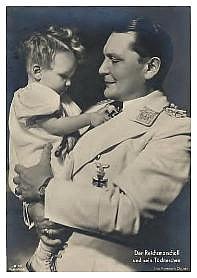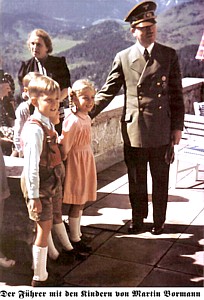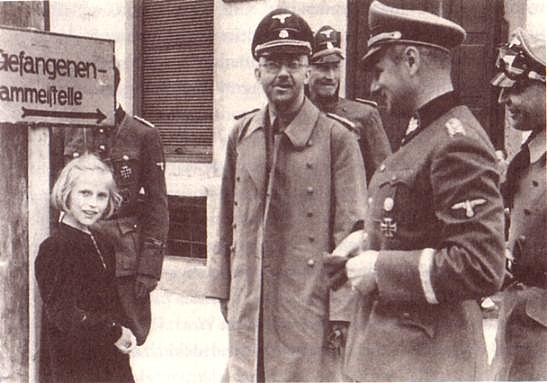Hess and his Father
The question of why Niklas hates his father leads to another important topic, the question of whether the child of a Nazi’s ideology is a product of the relationship that that child had or in some cases still has with their father or mother. Wolf-Rüdiger Hess had to grow up with the fact that his father was still alive and he could communicate with him. He sent a letter to him every month and had a total of 102 visits to Rudolf Hess while he was imprisoned in the Spandau fortress (Lebert 80). Hess grew up knowing his father and having a relationship with him. Rudolf Hess never once gave up his Nazi ideology and his son grew up with his father preaching those ideals to him. Wolf-Rüdiger Hess devoted himself to the release of his father from prison and joined groups whose goal it was to free Hess. There he associated with former Nazis and people devoted to his father just as he was. He never spoke out about politics for fear that the allied forces would revoke his visiting rights. When his father died in 1987 he realized that all his efforts had been useless. He became embittered and disillusioned at the world. Because his father was always there he was never able to create his own identity and ideology. Hess is the product of his father still being in his life and also never being able to separate his father’s actions from a parental figure.
Absent Parents
Helga Schneider was spared Wolf-Rüdiger Hess’s fate. In her book Let Me Go she tells her readers that in her lifetime she has only met her mother once after she was abandoned by her at the age of four. Her story is of her second meeting with her mother, twenty-seven years after the first one. Helga has never known her mother as anything more than a Nazi and the only memories she has are fragmented accounts of her mother’s complete devotion to the Nazi party. She grew up knowing of her mother’s guilt but not personally ever knowing her as a mother figure. Helga did not have her mother there to influence her ideology and also like Niklas Frank she was very young when her mother left. The fact that her mother was not in her life allowed Helga to reject her mother’s ideology and create her own. Helga grew to resent her mother not only as a Nazi but as a mother too, whereas most of the children of Nazis had fond memories of their fathers.
The exception to this fate lies with Gudrun Himmler. Her father died at the end of the war by poisoning himself with a potassium cyanide capsule. She was never in contact with him like Wolf-Rüdiger Hess but remained a sort of fanatic devoted to his memory and to his ideologies. Her father was not there for her after she was sixteen and still an adolescent, so why should she become a Nazi when she was grown up? The answer may be attributed to Gudrun’s experiences after the war as a result of her father’s role in the Nazi party. She and her mother were imprisoned for the better part of two years. They were treated as criminals by the allied powers and fed two meals of mushy peas a day. Gudrun went on a hunger strike to protest her and her mother’s treatment by the allied powers (Lebert 163). When they were finally released she and her mother were sent to a rural homeless shelter where they had to start all over. The Allies forced Gudrun to change her last name from Himmler to Schmidt (Lebert 165). Gudrun grew to hate the allied forces and in that hatred identified with her father’s ideology. Another factor that led Gudrun to identify with her father even though he was not around was that their personalities were so similar. This grew to be a big problem for many of the children of the Nazis.
Family Characteristics
Gudrun was a stubborn girl, but most of all she, like her father, was a dreamer. She lived in a fantasy land by which the name Himmler was sacred and her family legacy gave her privileges over others. To this day Gudrun Himmler says that her name has never brought her anything but good, even though there are many instances where she was fired or not hired because of her last name. She was not admitted to school after school and was scorned by her peers (Lebert 175). Almost all of the Nazi children have bits and pieces of their father’s personalities. Niklas Frank admits to this, Norbert Lebert describes Frank’s process as, “going into the deepest recesses of his personality and delivering a devastating verdict: that his father was cowardly, corrupt, sexually stimulated by power, brutish, pampered, soft. And with his words the son was also raging against himself. He had recognized his father’s cowardice in himself, felt his father’s heart beating in his own breast, and was tearing himself to shreds” (Lebert 141). Karl-Otto who is mentioned in My Father’s Keeper also says that in some circumstances he found himself in opportunistic situations and did the exact opposite of what his professional side told him to do because he did not want to be his father (Lebert 224).
The most controversial and undecided issue is the topic of whether Nazi children are victims of their parent’s actions for which they hold no responsibility or are they born guilty. My Father’s Keeper attempts to answer this question but never really comes up with a solid answer. The only real answer that they came up with is every child feels guilt but they all deal with it in different ways. Each child carries the burden of their father’s actions. Martin Bormann Jr. has long ago accepted that his father was a guilty man, but he also feels guilty for being related to his father and participating in the Hitler Youth. Stephan Lebert incorporates a piece of Dan Bar-On’s book The Legacy of Silence which observes that Martin Bormann seemed to physically carry the weight left on him by his guilt for his father’s deeds. Stephan Lebert observed the very same thing after his interview almost fifteen years later (120).
A Question of Responsibility
Many people who study this topic feel that the child should carry no responsibility for the parent’s actions. They should only be held responsible for their own actions, if they become Nazis then they should be held accountable but you cannot judge on someone’s parents alone. Others still maintain that the children are fruit from the poisonous tree and that anything they touch will rot. The fact that these children are related to such people means that they are also capable of committing atrocities and are dangerous to society. Their name is a curse and in most cases this is true. They faced scorn by the public and judgment for something that they had never done. Most children carry this guilt because they are told to do so and somehow feel responsible for the past. Some feel no shame or guilt outwardly because they are proud of their father and his actions cannot be wrong. Hess and Himmler carry this notion with them, but each has faced hardships because of it.
Conclusion
Now imagine again that you are fifteen. Your whole life is still ahead of you but is being dictated by someone else’s actions, your father’s actions. How will you turn out? Will you follow in your father’s footsteps, destined to become someone else? Or will you learn from your father’s mistake and carry on with your life educating others about the past? These answers will depend on many key factors: whether you can separate your father from his deeds, whether he will be around to influence you, if you have too much of his personality in yourself and how you carry the guilt of your own name. One thing is for certain, you will always have to deal with the consequences of your father’s actions but it is up to you how you deal with this guilt and if you carry on to make your own legacy. |


